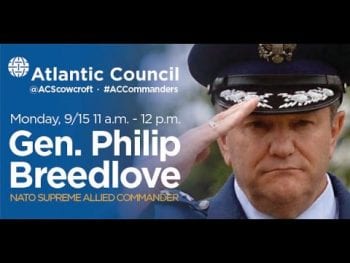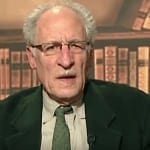Crossposted at strategic-culture.org
[dropcap]W[/dropcap]hen the democratically elected President of Ukraine was violently overthrown in February 2014 and replaced by a rabidly anti-Russian regime, not only the residents in the areas of Ukraine that had voted heavily for him (Crimea having voted 75% for him, and Donbass having voted 90% for him) were terrified by what they viewed to be a bloodthirsty new regime, but Russians were, too, because the dictators who were installed made clear their hatred of Russians and even of speakers of the Russian language — one of their first legislative initiatives was to outlaw the Russian language, but the blatant hatred there made the proposal die in Ukraine’s parliament because this new regime needed outside support, and outlawing a language spoken by around half of the nation’s population would have sparked international condemnation.

The oxymoronically named NATO stooge Breedlove keeps fanning the flames. Ironically, while the US military does have its share of unthinking idiots like Breedlove, or amoral corporatized careerists, it also has officers who know better than to support reckless military adventures dreamed up by Washington’s warmongering circles. Source : youtube.com
Shortly after Crimeans voted (yes voted, you hear that Western propagandists?) overwhelmingly on 16 March 2014 to separate from Ukraine and to rejoin Russia, of which Crimea had been a part until Nikita Khrushchev arbitrarily transferred Crimea to Ukraine in 1954, the top military commander at NATO, U.S. General Philip Breedlove, said that because Russia had protected Crimeans from invasion by the newly installed Ukrainian regime, which was threatening Crimeans if they were to hold a referendum to separate from Ukraine, “now it is very clear that Russia is acting much more like an adversary than a partner”, and he speculated sarcastically about the “next place where Russian-speaking people may need to be incorporated” into Russia — as if the people of Crimea didn’t have good reason to fear the new regime, and as if speakers of the Russian language in all countries were in the same situation and needed the same protection; and as if NATO itself had any right to comment about this matter at all, since Ukraine isn’t even a member-nation of NATO anyway. Ukraine is a nation that shares a long border with Russia, but does this give NATO a right to ‘defend’ Ukraine from ‘Russian aggression’? Is NATO trying to provoke a Russian invasion in order for NATO to have a pretext to launch a full-scale nuclear war?
Why was the top military commander of NATO commenting on this at all? He was representing the U.S. President, not the people of Ukraine, and certainly not the people of Crimea. The people of Crimea had good reason to be terrified by the new regime, but Obama’s general who was running NATO’s military operations, didn’t care about that at all.
And the threat that the United States and its allies were posing to Russian-speaking populations in other countries that border Russia was also being ignored by the U.S. and its allies.
Alexander Lukin wrote about this matter in Foreign Affairs on 17 June 2014:
Today, the West’s continued advance is tearing apart the countries on Russia’s borders. It has already led to territorial splits in Moldova and Georgia, and Ukraine is now splintering before our very eyes. Divisive cultural boundaries cut through the hearts of these countries, such that their leaders can maintain unity only by accommodating the interests of both those citizens attracted to Europe and those wanting to maintain their traditional ties to Russia. The West’s lopsided support for pro-Western nationalists in the former Soviet republics has encouraged these states to oppress their Russian-speaking populations – a problem to which Russia could not remain indifferent. Even now, more than two decades after the collapse of the Soviet Union, more than six percent of the population in Estonia and more than 12 percent of the population in Latvia, most of them ethnic Russians, do not have the full rights and privileges of citizenship. They cannot vote in national elections, enroll in Russian schools, or, for the most part, access Russian media. The EU, despite its emphasis on human rights outside its borders, has turned a blind eye to this clear violation of basic rights within them.
Why does the U.S. government not care about the rights of ethnic Russians in countries which border on Russia, and which treat like dirt, people whose families had moved there from Russia? Is the U.S. government trying to goad Russia into protecting those people, too?
Why was General Breedlove (who hardly breeds love for oppressed people of Russian descent) mocking Russian President Vladimir Putin about the “next place where Russian-speaking people may need to be incorporated”?
Is Obama trying to force Putin to either lose face at home, or else to force Putin to ‘provoke’ a NATO invasion, in order to provide NATO an ‘excuse’ to attack?
[dropcap]O[/dropcap]n 4 May 2016, Breedlove’s successor, U.S. General Curtis M. Scaparrotti, took over from Breedlove, and he condemned “an aggressive Russia … a resurgent Russia trying to project itself as a world power.” If the U.S. government has a right to “project itself as a world power,” then why doesn’t the Russian government possess the same right — especially in order to defend itself? The headline of that news report from the U.S. Department of ‘Defense’ was “‘Resurgent Russia’ Poses Threat to NATO, New Commander Says”, but precisely what ‘threat’ Russia poses to NATO wasn’t even suggested there, other than the vague charge of a “resurgent Russia striving to project itself as a world power.”
Is General Scaparrotti trying to goad Putin to either lose face at home, or else ‘provoke’ a NATO invasion? But now NATO is staging Operation Atlantic Resolve, their biggest-ever military maneuvers on Russia’s borders. This includes nuclear weapons.
When Nikita Khrushchev tried to plant Soviet missiles 90 miles from the U.S. in 1962, the American President, John Fitzgerald Kennedy was ready to go to a nuclear attack against the Soviet dictatorship; this was the Cuban Missile Crisis. Will Russian President Vladimir Putin soon be ready to go to a nuclear attack against the new American dictatorship, which is moving much farther against Russia’s democracy now, than the Soviet dictatorship ever did against America’s democracy then?
Does Obama think he’s playing some kind of game here? Khrushchev didn’t think it was any game; nor did Kennedy. Khrushchev backed down, in a deal in which the previous U.S. President’s, Dwight Eisenhower’s, initiation of installation of U.S. missiles in Turkey against the Soviet Union were also removed. Kennedy negotiated an elimination of both Eisenhower’s and Khrushchev’s provocative and dangerous acts, in a nuclear-armed world. Putin has been careful not to do anything that threatens the U.S., except to protect Russia from what by now is clearly U.S. aggression. But the fact that a democratic Russia has not violated a now dictatorial U.S., constitutes no excuse for U.S. Presidents continuing the aggression that U.S. President George Herbert Walker Bush started against democratic Russia.
Meanwhile, we have blatant NATO propaganda spread on German public television, asking “Is NATO expansion to blame for Crimean crisis?” and answering: not only no, but “just change NATO’s name” and we all should ignore Russia’s worries about the hostile U.S. military alliance that has spread right up to Russia’s borders and that’s intent upon posting nuclear missiles minutes from Moscow.
Do Western leaders really think that Western publics are stupid and callous enough to believe that? Is the leaders’ presumption, about this, correct? Is this the reason why nuclear war is getting perilously close while Western publics are worried about it little if at all?
 Investigative historian Eric Zuesse is the author, most recently, of They're Not Even Close: The Democratic vs. Republican Economic Records, 1910-2010, and of CHRIST'S VENTRILOQUISTS: The Event that Created Christianity.
Investigative historian Eric Zuesse is the author, most recently, of They're Not Even Close: The Democratic vs. Republican Economic Records, 1910-2010, and of CHRIST'S VENTRILOQUISTS: The Event that Created Christianity.
=SUBSCRIBE TODAY! NOTHING TO LOSE, EVERYTHING TO GAIN.=
free • safe • invaluable


